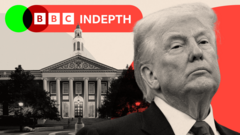With the Trump administration halting visa interviews, many Indian students are anxious about pursuing education in the U.S. They explore alternative paths while seeking support through social media and community networks.
Indian Students Face Uncertainty Amid U.S. Visa Interview Halts

Indian Students Face Uncertainty Amid U.S. Visa Interview Halts
The pause on U.S. student visa interviews leaves aspiring Indian students reeling, reconsidering their educational plans.
In a country that sends more students to the United States than any other, Indian youth are confronting a troubling reality as the Trump administration's recent decision to suspend visa interviews for foreign nationals casts a cloud over their academic aspirations. Over 330,000 Indian students currently studying in U.S. universities now find themselves in a state of uncertainty, with the prospect of pursuing higher education in the U.S. becoming increasingly unclear.
Students have taken to social media to express their concerns, some even opting to delete posts and unfollow accounts to avoid scrutiny following the State Department's announcement regarding potential social media screenings. In response, many have turned to private, encrypted messaging apps to share updates and experiences. Others are visiting what are colloquially known as "visa temples," places where they offer prayers believed to improve their chances of obtaining study or work visas.
Career counselors are inundated with inquiries from students worried about their visa appointments, as confusion mounts among those with admission letters and concerns persist for those already studying in the U.S. Karan Gupta, a counselor who advises approximately 150 students a year, remarked on the surge in calls he has received. Students with concrete admission offers are particularly anxious, uncertain if they will be able to secure visa appointments in time.
Kaushik Sharma, a hopeful applicant, shared, “I have carefully built my profile to get into top policy programs in the U.S., but the current environment makes me nervous about applying.” Many students, like Sharma, are re-evaluating their options, considering academic paths in countries like the UK and Singapore as they weigh the risks associated with studying in America amidst such unpredictable circumstances. As they navigate this challenging landscape, Indian students are leaning heavily on their extended family networks in the U.S. for support, creating online "war rooms" to strategize and prepare.
As the situation evolves, the fears and hopes of aspiring Indian students are tangible, highlighting a larger conversation about international education access and the impact of policy changes on personal dreams.





















